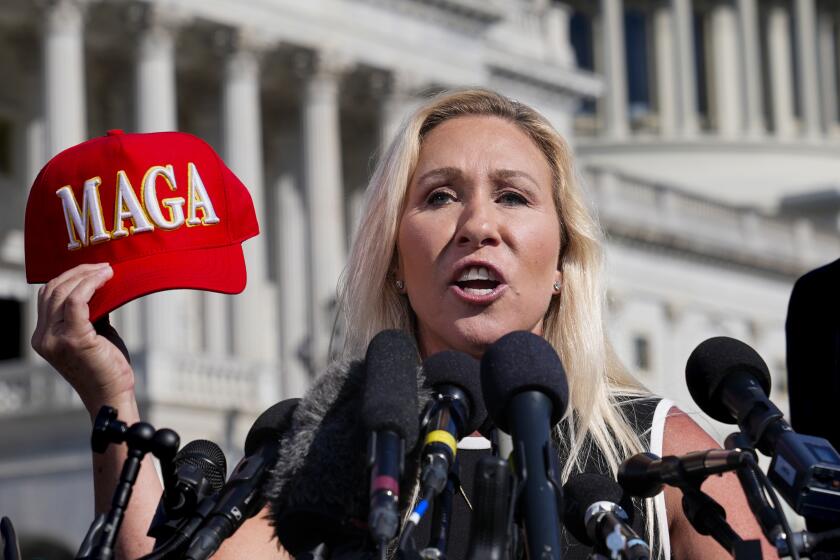Why your privacy still comes at a cost
In case you missed it, your elected representatives bowed to intense pressure from phone companies last week and voted to allow them to keep charging whatever they want to protect your privacy.
I’m talking, of course, about the up to $24 a year that millions of Californians are charged to keep their numbers out of the phone book and its electronic cousins.
A bill -- SB 1423, written by state Sen. Sheila Kuehl (D-Santa Monica) -- would have given land-line users the same courtesy already extended by law to those who use cellphones: to have your number unlisted free.
“Unlike every other service we pay phone companies for, this isn’t a matter of convenience,” Kuehl told me the other day. “It’s about safety and peace of mind.”
Too bad more of her legislative colleagues didn’t see it that way.
Kuehl’s bill failed to garner the 21 votes needed to pass in the Senate and make its way to the Assembly. The final tally was 16 senators for and 16 against, with eight brave souls not even voting.
Kuehl, who hits the term-limit wall in November, said she wouldn’t be reintroducing the bill and that no one else in the Senate had stepped forward to champion the cause next year.
“That’s it,” she said.
To most consumers, this should have been a no-brainer. As I say, the California Public Utilities Code already stipulates that cellphone users can’t be charged a cent for having their numbers unlisted.
The thinking there is that because each call can chew into your minutes, cellphone users shouldn’t be penalized financially for keeping unwanted callers at bay.
Land lines may not charge for incoming calls, but what price do you put on your time? Not to mention the benefit of keeping away identity thieves, con artists, marketers, stalkers and others who stand to gain from ready access to your name and number.
Moreover, the California Constitution establishes an individual’s right to privacy. It doesn’t seem like much of a stretch to conclude that land lines merit the same privacy safeguards as cellphones -- at the same price.
The phone companies, however, came out with guns blazing. They declared that lawmakers shouldn’t concern themselves with the fine points of their operations.
“In a competitive marketplace, the Legislature shouldn’t be in the business of setting prices for features,” said Jon Davies, a spokesman for Verizon Communications Inc. “They should let consumers decide which ones they want to pay for and which ones they don’t.”
H. Gordon Diamond, an AT&T; Inc. spokesman, emphasized that phone companies have a long-standing mandate to publish directories.
“We do so at a significant expense, and are required to provide these white-page listings not only to our customers but to any other phone company that requests them -- for free,” he said.
That’s undoubtedly a pricey endeavor. On the other hand, phone companies profit by selling ads for their directories, so it appears to pencil out.
Whatever else, there’s the question of how much it costs phone companies not to provide a service to customers. How much does it really cost them to unlist a number?
In the past, phone companies charged about 25 cents a month to keep you out of the phone book. Since deregulation last year, that amount has skyrocketed. AT&T; now charges $1.25 monthly for the privilege. Verizon charges $1.50.
For what? Presumably it’s only a matter of a few keystrokes to remove someone from the directory database. Once you’re out, you’re out.
“There’s no relationship between what they have to do once and what they charge you for every month to keep it that way,” Kuehl said.
She said phone-company execs testified in Sacramento that their charges for unlisted numbers didn’t actually reflect their costs. Rather, they said, the fees are important for overall revenue.
An analysis of Kuehl’s bill by Senate committee staff determined that AT&T;, for one, would lose about $50 million in annual revenue if it had to stop charging for unlisted numbers.
AT&T; had $11.95 billion in net income last year.
Kuehl said she’d seldom seen a lobbying effort as ferocious as the one mounted by phone companies in opposing her legislation.
“They assigned at least one lobbyist per member of my committee,” she said. “There were a lot of lobbyists working on this. They focused all their energy on killing this bill.”
AT&T; warned lawmakers that passage of SB 1423 would cost California $237,000 in bureaucratic procedures. Verizon said there’d be a big loss in income tax for the state if the phone companies earned less money.
Kuehl said some lawmakers were swayed before the vote when the powerful Communications Workers of America union issued a “floor alert” saying the bill “unfairly targets companies with union employees.”
The union didn’t respond to calls for comment. However, Kuehl said the floor alert was taken by some lawmakers as a warning that the phone companies might lay people off if their revenue was jeopardized.
She also said some reelection-minded senators saw political danger in crossing the phone companies on the issue.
According to public records, AT&T; spent more than $3 million last year on campaign contributions and lobbying in Sacramento. Verizon spent more than $1 million.
“Most members take the phone companies very seriously,” Kuehl said. “They’re big players.”
So if you’re among the estimated 40% of AT&T; residential customers in California who have chosen to be unlisted, or the roughly half of all Verizon residential customers, now you know why you’ll keep paying for a little peace of mind.
Because your privacy isn’t as important as their profit.
--
Consumer Confidential runs Wednesdays and Sundays.
Send your tips or feedback to david.lazarus@latimes.com.
More to Read
Get the L.A. Times Politics newsletter
Deeply reported insights into legislation, politics and policy from Sacramento, Washington and beyond. In your inbox three times per week.
You may occasionally receive promotional content from the Los Angeles Times.







